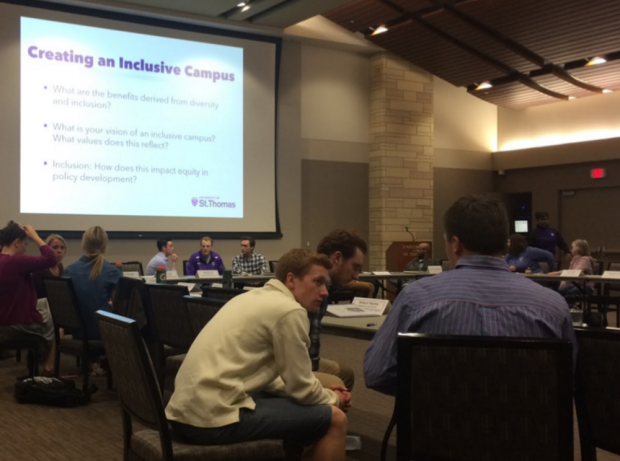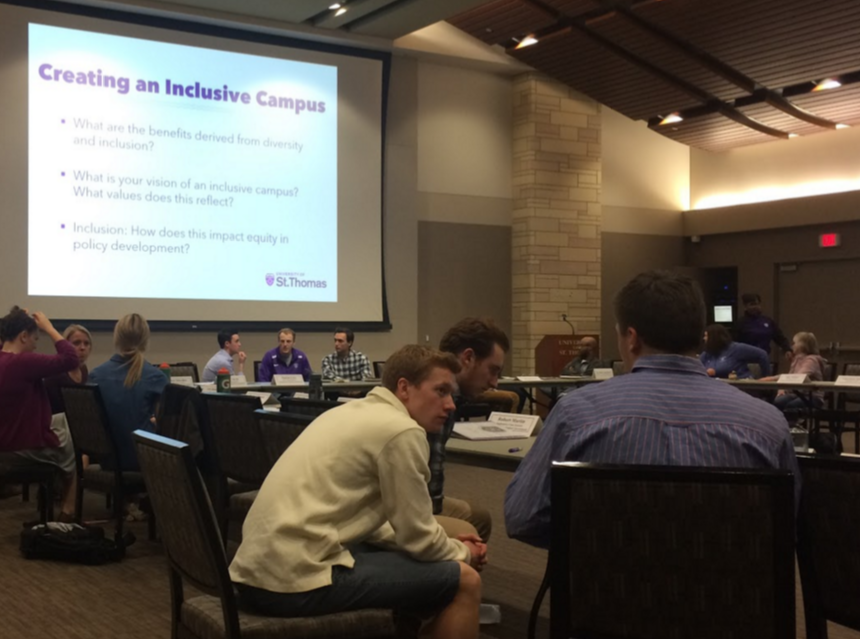
In response to mounting pressure from students, faculty and staff at St. Thomas, the university administration has announced new initiatives aimed at creating a more diverse and inclusive environment on campus.
The push for change began in November when leaders of multicultural clubs protested Undergraduate Student Government’s funding allocation process, which they saw as discriminatory. Students — angry at their clubs’ unexpectedly paltry budgets — staged a sit-in at a USG meeting, demanding action.
USG executives explained that the error was a clerical one, and the budget issue was resolved quickly. The student protesters, however, remained frustrated at the state of race relations on campus and soon formed the organization Students of Color: Claim our Seats.
“SOCCOS wasn’t just about USG and the budgeting,” organization member and USG Vice President for Diversity Gabbie Ryan said. “That was the tipping point, but that’s not where we are now.”
The group wrote a list of demands for USG, which has since met most of SOCCOS’s stipulations, according to Ryan.
SOCCOS members have also met with President Julie Sullivan, Provost Richard Plumb and other administrative officials to discuss changes they want to see on campus.
The “strategic plan” of recommendations, which is now public on the group’s Facebook page, details its concerns about St. Thomas’ support of under-represented students.
The strategic plan also lists numerous “action goals” to be achieved by 2020. SOCCOS has requested a new multicultural space in the Anderson Student Center, more emphasis on hiring racially diverse faculty, staff and resident advisers and a two-course diversity core curriculum requirement.
“Our campus implicitly emphasizes tolerance rather than acceptance in the way we view students of color,” the group charged in the document. “St. Thomas continues to allow negligence and misunderstanding of racial issues to exist on campus.”
The most recent development came on March 2, when the Anti-Racism Coalition, a group of more than 56 faculty and staff members, wrote an open letter to Sullivan that said they stood “in solidarity with our students of color.”
Sullivan penned a response letter to the faculty and staff coalition, which is also posted on St. Thomas’ website. In it, she wrote that inclusion and diversity are fundamental to the university’s new brand, “All for the common good.”
“(A) vision of providing an equitable and inclusive education … is an absolutely necessary goal mandated by both our convictions and our mission to pursue the common good, and a goal that the administration and I fully support,” Sullivan wrote.
She also laid out plans to meet the demands of SOCCOS and the Anti-Racism Coalition.
Campus changes
Campus will soon see multiple changes: A multicultural space will open in the Frank and Judy Sunberg Student Leadership Center on the third floor of the ASC, and Associate Vice President for Diversity and Inclusion Artika Tyner will provide diversity training to faculty, staff and student departments and organizations.
Tyner has already presented on implicit (or unconscious) bias, stereotypes and race relations to various groups on campus, like the President’s Cabinet, Residence Life and USG.
Tyner presented at USG’s March 6 meeting, a direct result of its November clerical error in multicultural clubs’ budgeting.
Among the new initiatives discussed at the start of spring semester, one of USG’s biggest goals was more awareness and understanding about diversity, according to USG Vice President of Administrative Affairs Rebekah Nelson.
“With the sit-in that happened last semester, with students voicing their opinions and really showing us how they felt … We just know that something needed to be done,” Nelson said. “We wanted to educate ourselves, and we knew (Tyner) would be the best source to go to.”
Tyner said USG members are uniquely positioned to enact the changes regarding race she believes are necessary.
“These are the leaders within their classroom; more importantly, these are the leaders for the future. So as part of leadership training, we must have — at the forefront — cultural intelligence. How do we work with other people across difference and find common ground … related toward building a more just world?” Tyner said.
RAs, apartment coordinators, graduate student workers and hall directors also heard from Tyner at this semester’s early-February training. Residence Life Director Aaron Macke said Tyner helped further the department’s mission to create a safe, comfortable space for all residents.
“Our focus for this spring semester is how we as staff can help our resident population engage with one another, in particular engage with one another around areas of difference,” Macke said. “(Tyner’s training) is the foundation so that when we go into conversations with students … we’re doing so from a more culturally competent standpoint, from a more aware standpoint.”
A longer version of this story appeared on TommieMedia.com on March 30. Due to concerns brought to the attention of TommieMedia by students and the St. Thomas administration, this story has been revised.
Sophie Carson can be reached at sophia.carson@stthomas.edu.


